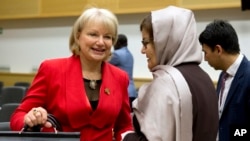A threatened gap in global health funding because of a new ban on some U.S. aid prompted a hastily called international meeting of about 50 governments in Brussels Thursday. The major concern is continuing to support family planning services for poor countries.
At an estimated $10 billion a year, the U.S. provides the lion’s share of funding for global health services. But, as one of his first acts, President Donald Trump signed a decree prohibiting foreign NGOs that provide abortions or abortion counseling from receiving U.S. money, even if the groups use separate money for those purposes.
The move has raised alarm among international leaders, who see family planning, one of many services provided by the organizations, as a necessary and effective means of helping lift developing countries out of poverty. Leaders are also worried that a lack of U.S. funding will result in a rise in unsafe abortion practices.
Countries that gathered at a hastily called meeting said they hope to raise $600 million for family planning programs if the Trump administration revokes U.S. aid.
The first $100 million in pledges toward that goal has been made, the attendees said.
Other health services at risk
Jen Kates is the vice president and director of Global Health and HIV Policy at the Kaiser Family Foundation, a U.S. public health think tank.
She said the proposed ban on U.S. funding is broad and would affect much more than family planning services. She said funding for other services that an NGO provides also is in jeopardy.
“It couldn’t receive U.S. HIV support, for example, or maternal and child health support, if it did [abortion-related] services with non-U.S. money,” she said. “So that just opens up the reach of this policy to a much wider range of organizations, which I think has led to some greater concern and urgency and more reaction from a wide range of groups about the implications.”
Trump proposal may go further
Previous U.S. bans have been enacted under Republican administrations dating back to President Ronald Reagan. They have involved withholding U.S. support for family planning services to NGOs that provide abortions or abortion counseling.
Kates explained that the Trump policy expands the reach by threatening to withhold monies for all global health services.
Through its many programs, the United States has saved the lives of millions of people around the world, she said.
“The U.S. support has also been cited as an important example of ‘soft power’ — of ways the U.S. works in the world through non-military means to achieve national security goals, to secure nations and populations. So it’s definitely raised concerns about the impact on those goals and the progress that’s been made so far.”
Kates said specific details of the proposed global health funding ban have not yet been issued by the Trump administration, so it is not yet in effect. She said guidance is expected soon.





